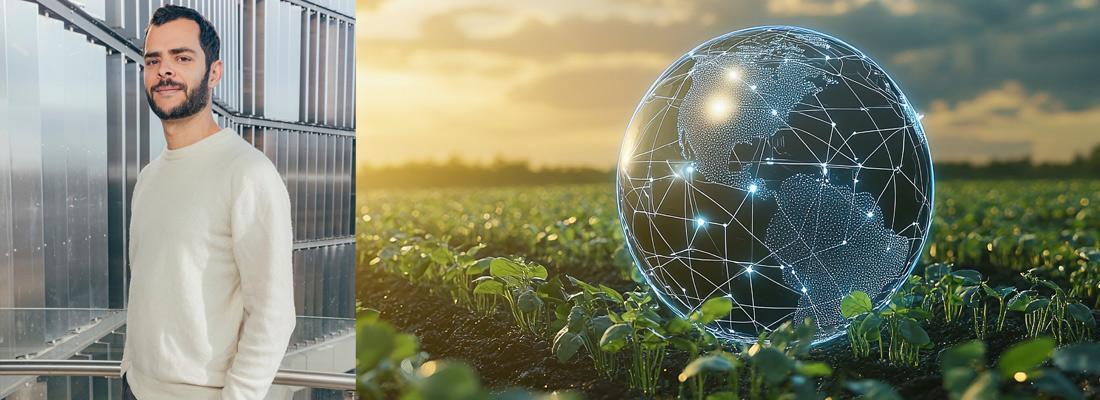Society and regional strategies Reading time 5 min
Taxation, Trade and the Environment: Connecting the Threads of the Global Economy
From multinationals and tax arbitrage to environmental challenges, Mathieu Parenti’s research explores the major imbalances of the global economy. Meet an economist who wants to shed light on public policy.
Published on 25 July 2025

After completing a PhD in international economics at Université Paris 1 Panthéon-Sorbonne, Mathieu Parenti pursued an academic career at Université Libre de Bruxelles before joining INRAE and Paris School of Economics in 2023 as a junior chaired professor. He currently leads two programs: one on environmental tax policies at the EU Tax Observatory (EUTO), and another on quantitative models of international trade at the Institute for International Macroeconomic Policy (I-MIP).
A recognized specialist in international economics, Mathieu Parenti studies the role of multinational firms and the fiscal and environmental externalities that arise in open economies. His work has been published in leading academic journals such as Econometrica, Review of Economics and Statistics, Journal of the European Economic Association, and Journal of International Economics. His outstanding academic track record was recognised by the jury of the Best Young Economist Award 2025, which selected him as one of three nominees alongside the winner.
We sat down with him to learn more about his research areas and the scientific ambitions driving them forward.
Your research addresses international issues such as taxation, trade, and environmental policies. What led you to connect these themes?
Understanding the strategies of large firms in a globalized world is essential to designing effective economic and environmental policies.
Mathieu Parenti : My interest in globalization initially led me to study the rise of large — often multinational — firms and their role in international competition. These companies have reshaped the landscape: countries now compete to attract their economic activities and jobs. As the main beneficiaries of free trade, these firms base their strategies among other things on exploiting tax and regulatory differences across countries. These arbitrage strategies require us to bridge disciplinary silos: in an open economy, any unilateral policy — be it environmental, fiscal or trade-related — is constrained by the mobility of multinational firms, which can reorganize their operations in response.
Let’s take a concrete example: an ambitious global minimum tax on multinationals would likely prompt large U.S. pharmaceutical companies to relocate activities currently concentrated in Ireland back to the United States. In doing so, this would reduce European exports and therefore U.S. trade deficits with Europe. As a result, it would also reshape the balance of power in transatlantic trade negotiations. This is precisely what a cross-cutting approach between taxation and international trade can help us understand.
You recently worked on the links between trade policy and sustainability, especially in the agricultural sector. Why is it important today to better align these dimensions?
MP : Our work on pesticides illustrates this challenge well. Without border adjustments, unilateral environmental policies generate major leakage effects, as production shifts to countries with weaker standards. This disconnect between environmental goals and global competition undermines not only the effectiveness of green policies but also their public support. Citizens may be swayed by protectionist rhetoric from parties that are not necessarily concerned with environmental issues, especially if they unfairly penalize domestic producers. This can fuel a race to the bottom in environmental terms. On the other hand, better alignment can lead to more coherent policy design — such as carbon border adjustments — that protect both the environment and competitiveness while reinforcing public support for necessary transitions.
Is there an emerging research question or issue that you would like to explore further in the coming years?
MP : There are two main directions I'm especially interested in. First, expanding the study of pollution beyond pesticides to chemical pollution more broadly. Second, exploring innovation in agriculture: precision farming, biopesticides, and the impact of genomic sequencing techniques on agricultural practices. These innovations are redefining the trade-offs between productivity and sustainability. I would like to develop interdisciplinary collaborations, particularly within INRAE, to better understand how economic incentives can accelerate these technological transitions.
You were one of three economists, in addition to the winner, nominated by the jury for the Best Young Economist Award 2025. What does this recognition mean to you?
MP : Through the lens of multinationals, I have aimed to break down the silos in the study of globalization by bringing together themes that traditionally don’t intersect. I have also tried to combine theoretical and empirical approaches, while keeping an eye on the real-world relevance of results for public debate. This nomination is a great honor and a strong encouragement to continue in this direction: developing analytical tools that help policymakers navigate a world where trade, taxation, and environmental challenges are increasingly intertwined.
Junior Professor Chairs at INRAE
Junior Professor Chairs (Chaires de professeur junior – CPJ) are a recruitment pathway open to researchers holding a PhD and already engaged in a trajectory of scientific excellence.
These three-year tenure-track positions are based on a research and teaching project and may lead, after evaluation, to a permanent position as senior researcher (Directeur or Directrice de recherche, 2nd class).
Recruited scientists carry out their project within an INRAE research unit, in connection with the institute’s major themes (agriculture, food, environment), and benefit from structured support.
This scheme aims to attract high-potential profiles, both from France and major themes, who are capable of conducting high-level research and getting involved in collaborative projects, particularly at the European level.
An opportunity to build an ambitious scientific career. Find out more >>
